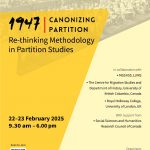The conference at LUMS brought together scholars from India, North America (Canada and the USA), the UK, Germany, France, the Netherlands, Italy, and Pakistan to consider current work on Partition and future directions in the field.
Re-thinking Methodology in Partition Studies: Schedule
Mushtaq Ahmad Gurmani School of Humanities and Social Sciences
The Lahore University of Management Sciences
22-23 February 2025
in collaboration with The Centre for Migration Studies and Department of History, University of British Columbia, Canada, & Royal Holloway, University of London, United Kingdom. With support from the Social Sciences and Humanities Research Council of Canada
February 22, 2025
9:00-9:30: Tea
9:30-10:15: Opening Remarks and Welcome
Nadhra Khan, Lahore University of Management Sciences
Anne Murphy, University of British Columbia
Sarah Ansari, Royal Holloway, University of London
Debjani Sengupta, Indraprastha College for Women, University of Delhi (online)
Avishek Ray, National Institute of Technology, Silchar (online)
Ali Khan, Dean MGSHSS, Mushtaq Ahmad Gurmani School of Humanities and Social Sciences
Waqar Zaidi, Chair, Department of Humanities and Social Sciences
Session 1: Making memory, 10:15am-12:45pm
10:15-10:45: The ‘Other’ community: Situating Christians in the Partition of the Punjab, Yaqoob Khan Bangash, Dean, Faculty of Humanities and Social Sciences, Information Technology University, Pakistan
10:45-11:15: Manipulation of Memory: Partition and the Indian State Since 2014 (online), Manimugdha Sharma, University of British Columbia, Canada
11:15-11:45: Partition Violence and National Unity: Pakistan’s Cinema from the 1960s, Kamran Asdar Ali, University of Texas at Austin, USA
11:45-12:15: Reflection/Discussion Respondent: Ali Usman Qasmi, Lahore University of Management Sciences, Pakistan
12:15-12:30 Tea
Session 2: Memorializing practices at and across borders, 12:30noon-2:00pm
12:30-1:00: Memorializing Partition across the Indo-Pak Border: Ethnographic Reflections on (the limits of) Comparison, Collaboration and Ethics, Philipp Zehmisch, University of Heidelberg, Germany
1:00-1:30: Digital diasporas beyond the ‘empathy machine’: The potentials and perils of using Virtual Reality (VR) technology in public memory work on the partition (online), Navtej Purewal and Eleanor Newbigin, School of Oriental and African Studies, UK
1:30-2:00: Reflection/Discussion Respondent: Ali Raza, Lahore University of Management Sciences, Pakistan
2:00-3:00 Lunch Break
Session 3: Partition spacialities, 3:00-4:30pm
3:00-3:30: The Maps of Partition: Visual Methods and Partition History, Willem van Schendel University of Amsterdam and International Institute of Social History, Netherlands
3:30-4:00: The prose of marginality: Kingsway and Walton, a study of the 1947 Partition’s refugee camps, Anne Castaing & Mehraj Iftikhar, Centre for South Asian and Himalayan Studies (CESAH) and the School for Advanced Studies in the Social Sciences (EHESS), France
4.00-4:30: Reflection/Discussion Respondent: Ilyas Chattha, Lahore University of Management Sciences, Pakistan
4:30-5:00: Tea
Session 4: Technologies of memory, 5:00-6:30pm
5:00-5:30: Reconstructing the Human Experience of Partition through Podcasts: a Study of ‘Partition Voices’ and ‘Empire’ (online), Cecilia Varuzza, University of Essex, UK
5:30-6:00: A taste of displacement: Partition, food and memory-making in Muslim families, Siobhan Lambert-Hurley, University of Sheffield, UK
6:00-6:30: Reflection/Discussion, Respondent: Furrukh Khan, Lahore University of Management Sciences, Pakistan
February 23, 2025
10:00-10:30: Tea
Session 5: Refocusing Partition Studies: The place of Sindh, 10:30am-12pm
10:30-11:00: Post Ayodhya Memories of Anti-Hindu Violence in Sindh. Ashok Kumar Khatri and Ghazal Asif Farrukhi, Lahore University of Management Sciences, Pakistan
11:00-11:30: Exploring Culturally Inclusive Translation in Partition Studies: A Perspective from Sindh, Rafique Wassan, University of Sindh, Pakistan
11:30-12:00: Reflection/Discussion, Respondent: Tahir Kamran, Beaconhouse National University, Pakistan
Session 6: Visualization, 12:00-2:00pm
12:00-12:30, Experiencing Partition − The Visual Way. Sadia Kamran, Government College University, Lahore, Pakistan
12:30-1:00: Evolution of Partition Narratives in Art from Post-Partition to the Contemporary Era, Sadia Safdar/Khurram, Govt. Associate College for Women, Manga Mandi, Lahore, Pakistan
1:00-1:30: Art of the Partition and the Partition of Art, Quddus Mirza, Beaconhouse National University, Pakistan
1:30-2:00: Reflection/Discussion, Respondent: Nadhra Khan, Lahore University of Management Sciences, Pakistan
2:00-3:30: Lunch Break
Session 7: Creative Engagements, 4:00-5:00pm
3:30-4:30: Performance/Reflection: I & Thou: The Pedagogy of Partition Studies, Shabnam Syed Khan and Iram Zia Raja, National College of Art, Pakistan
4:30-5:00: Bilingual short story reading (Punjabi/English), Story by Zahid Hussain, Lahore University of Management Sciences. Translation by Anne Murphy, University of British Columbia, Canada
Session 8: Roundtable and closing discussion, 5:00-6:30pm
Muhammad Waseem, Emeritus, Lahore University of Management Sciences, Pakistan
Naumana Kiran, University of the Punjab, Lahore, Pakistan
Sarah Ansari, Royal Holloway, University of London, UK
Kamran Asdar Ali, University of Texas at Austin, USA

